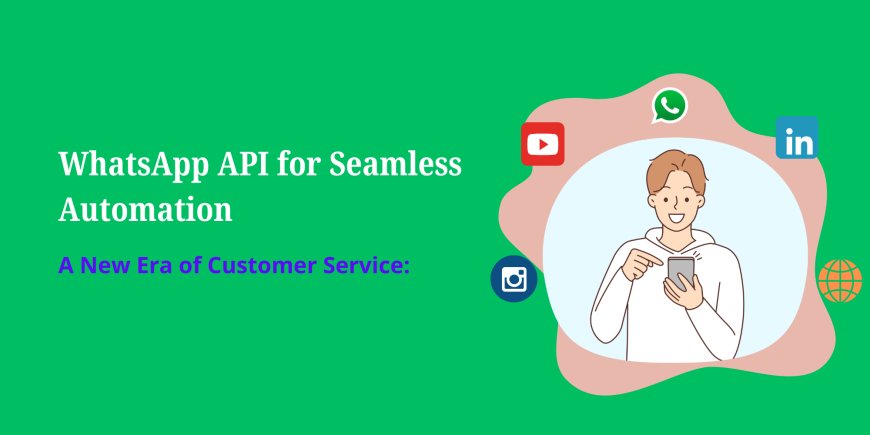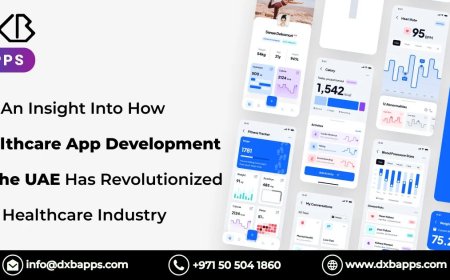WhatsApp API for Seamless Automation: A New Era of Automation
Discover how WhatsApp API is transforming business automation by streamlining customer support, sales, and marketing. Learn how automation can improve efficiency, enhance personalization, and drive growth.

In the fast-paced world of digital communication, businesses are increasingly turning to automation to streamline their customer service, sales processes, and overall operations. Among the most powerful tools available today is the WhatsApp API — a game-changing solution that allows businesses to automate and scale their messaging on the world’s most popular messaging app. With over 2 billion active users, WhatsApp has proven to be a trusted communication platform. The WhatsApp Business API is revolutionizing how businesses engage with customers, providing a seamless automation experience that is driving growth, improving customer support, and enhancing operational efficiency.
In this blog post, we’ll explore how the WhatsApp API is ushering in a new era of automation and why it’s an essential tool for modern businesses.
What is WhatsApp API?
The WhatsApp API is a business solution designed to allow medium and large-sized companies to interact with customers at scale. Unlike the standard WhatsApp app, which is meant for personal use, the API is tailored to handle large volumes of messages, enabling businesses to send and receive messages programmatically. This API can be integrated with existing business systems like CRM software, marketing automation tools, and helpdesk platforms, allowing businesses to create seamless automated workflows that are both efficient and customer-friendly.
The key feature of WhatsApp API is its ability to automate customer interactions while still providing a personalized experience. This enables businesses to handle common inquiries, send notifications, and provide support 24/7 without needing constant manual intervention.
Why WhatsApp API Automation is a Game-Changer
- Instant, 24/7 Customer Support
With WhatsApp API, businesses can provide round-the-clock support through automated messaging. Whether customers are asking about product details, delivery status, or FAQs, businesses can automate responses to these common inquiries, freeing up human agents to handle more complex issues.
For instance, when a customer asks about store hours, an automated response can instantly provide the information. When a product is shipped, the system can automatically notify the customer about the tracking number, estimated delivery time, and any other relevant details. This not only improves customer satisfaction but also reduces response times and helps businesses maintain a high level of service at all hours.
- Personalized Engagement at Scale
One of the most powerful aspects of WhatsApp API automation is the ability to personalize automated messages. With the ability to integrate with CRM systems, businesses can send personalized messages based on customer data, such as previous purchases, preferences, or even name.
For example, after a customer makes a purchase, the system can send an automated message thanking them by name and providing information on shipping or upcoming promotions tailored to their interests. Personalized communication strengthens customer relationships and builds loyalty, resulting in increased conversion rates and higher customer retention.
- Streamlined Marketing Campaigns
WhatsApp API is not just for customer support—it’s also a powerful tool for marketing automation. Businesses can set up automated marketing campaigns to engage customers with offers, discounts, or updates on new products. Whether it’s an abandoned cart reminder or a special promotion for a loyal customer, WhatsApp API helps businesses deliver targeted messages that can drive sales.
For example, if a customer adds products to their cart but doesn’t complete the purchase, WhatsApp API can automatically send a reminder with a special offer or discount code to encourage them to finalize the purchase. This is a proven strategy to reduce cart abandonment rates and boost sales.
- Efficient Lead Generation and Follow-Ups
Lead generation and nurturing are critical for businesses looking to grow. WhatsApp API allows businesses to automate the lead qualification process, making it more efficient. By setting up automated conversations that gather information about potential customers’ needs, businesses can qualify leads quickly and route them to the right department for follow-up.
Once a lead is captured, automated follow-up messages can be sent to keep the conversation going. Whether it’s sending more information about a product, offering an exclusive deal, or providing a free consultation, businesses can nurture leads seamlessly and move them further down the sales funnel.
- Order and Payment Notifications
For eCommerce businesses, WhatsApp API is a valuable tool for keeping customers updated on their order status. Once an order is placed, automated messages can be sent to confirm the purchase, provide shipping information, and even notify customers when their order is out for delivery.
Additionally, payment reminders and receipts can be sent automatically, reducing the need for manual communication and enhancing the overall customer experience. This proactive communication helps build trust with customers, making them feel informed and valued throughout the purchasing journey.
- Cost Savings and Efficiency
By automating routine tasks, businesses can significantly reduce operational costs. Instead of hiring additional customer service agents to handle basic inquiries, businesses can rely on WhatsApp API automation to handle the bulk of communication. This frees up resources to focus on higher-value tasks, such as sales strategy, product development, and customer retention.
WhatsApp automation also ensures faster response times, leading to improved customer satisfaction. In turn, this results in higher conversion rates, as customers are more likely to engage with businesses that respond promptly and efficiently.
How to Get Started with WhatsApp API Automation
- Apply for WhatsApp API Access
To get started, businesses must apply for access to the WhatsApp Business API. This can be done through an official WhatsApp Business Solution Provider (BSP), which helps set up the API and integrate it with business systems.
- Integrate with Your Business Systems
Once granted access, businesses can integrate WhatsApp API with their CRM, helpdesk software, and other tools they use for customer support, sales, and marketing. This integration is key to creating automated workflows that improve efficiency.
- Create Automated Messaging Flows
Design automated messaging workflows that handle common inquiries, order updates, promotional offers, and more. Use tools like chatbots or pre-written templates to set up these flows and personalize them based on customer data.
- Monitor and Optimize
As with any automation system, it’s essential to continuously monitor the performance of your WhatsApp API messages. Use analytics to understand customer engagement, optimize messaging flows, and identify opportunities for improvement.
Conclusion
The WhatsApp API is paving the way for a new era of automation that empowers businesses to engage with customers more efficiently, improve customer satisfaction, and drive growth. By automating routine tasks like customer support, order updates, and marketing campaigns, businesses can save time, reduce costs, and focus on high-impact activities.
Whether you're an eCommerce business, service provider, or even a local brand, WhatsApp API automation is a valuable tool that can help you scale your customer communication and foster better relationships with your audience. Embrace WhatsApp API for seamless automation and propel your business into the future of customer engagement.
What's Your Reaction?


























